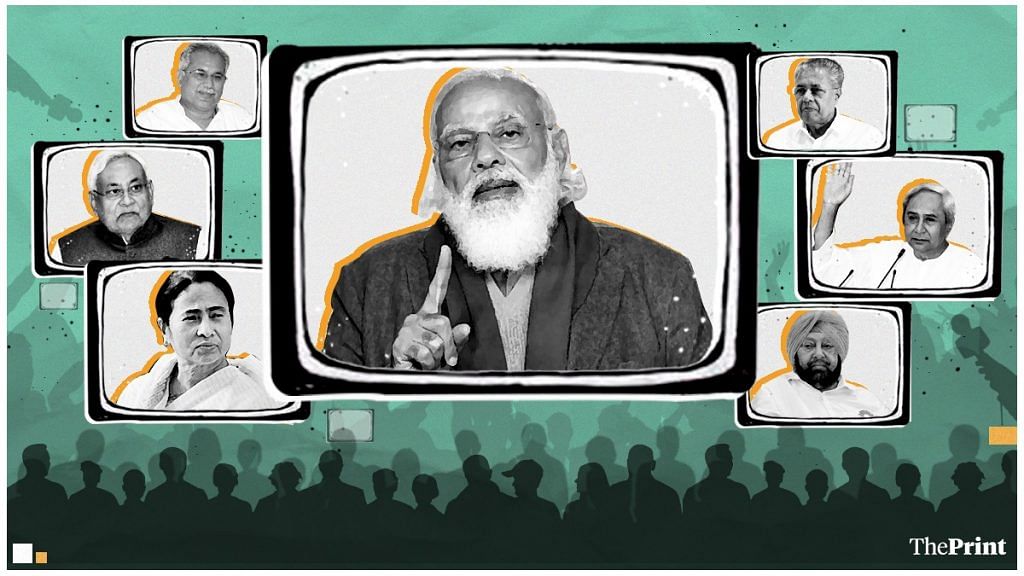Whenever India’s fight against the coronavirus is studied in future, the period will be remembered for how “we worked together” and set the “best example” of cooperative federalism, Prime Minister Narendra Modi had told chief ministers in a video conference on 16 June 2020. When he meets them, virtually, again on Monday — the tenth time in ten months since the Covid-19 outbreak — these words must be ringing in their ears. Many of them join the meeting with the PM after piloting assembly resolutions against the three Central farm laws and withdrawing general consent for Central Bureau of Investigation probes in their states.
That apart, the PM-CMs meetings as a mechanism must be a mystery to many participants. After all, there is already an Inter-State Council chaired by the PM with six Union Cabinet ministers and all CMs as its members. But, the Council had its last meeting in July 2016. It doesn’t matter that in 2012, Modi, then Gujarat CM, had demanded that the Council meetings should happen at least twice a year.
With the abolition of the Planning Commission, the National Development Council (NDC), also chaired by the PM and including CMs, became infructuous but a formal declaration is still awaited. The last time one heard about the NDC was in June 2019 when West Bengal CM Mamata Banerjee spoke of its “quiet burial.” PM-headed NITI Aayog Governing Council, which also has CMs as members, was expected to supplant the NDC. The last time the Governing Council met was in June 2019.
Also read: Modi got all the credit for lockdown. Now, he wants states to share risk of unlocking India
Nine meetings and growing scepticism
With existing mechanisms for the Centre-States consultations and collaboration not functioning, the PM-CMs meetings over Covid-19 are gradually developing as a separate mechanism altogether. But if you speak to chief ministers in private, especially those from opposition parties, they are sceptical about this even after nine meetings.
There is a reason for their lack of enthusiasm about the PM-CMs meetings – they are all about the Prime Minister and his speeches, with CMs gathered largely for effect. His speeches are live streamed and telecast by all TV channels while those of the CMs aren’t made public. When the Prime Minister speaks at the end of each of these meetings, it’s much like his address to the nation, reflecting little or nothing of what the CMs said. Media managers of these CMs have a tough time later getting their versions out, howsoever brief. The PM naturally emerges from those meetings, looking like a teacher who has delivered the lecture and it’s now for students (read CMs) to learn the lesson or ignore it and get punished by the parents (read voters). The whole exercise ends up enhancing respect for the dedicated teacher. Students must be held accountable for the results and must do the homework — bring down positivity rate below 5 per cent, fatality rate below 1 per cent, do more RT-PCR tests, trace contacts and so on and so forth.
Also read: Teflon Modi does not have one Achilles heel, but two
The CMs’ dilemma
A 2008 speech by Congress leader Rahul Gandhi could probably capture the dilemma of the CMs in their meetings with the PM. The Congress leader had claimed that when he was a student, asking questions at St. Stephen’s College, his alma mater, wasn’t encouraged and those who asked too many questions were looked down upon, triggering a huge outrage among the alumni.
Well, some students in Modi’s paathshaala — the CMs from non-BJP parties, at least — also ask too many questions. They are not looked down upon though. They are simply ignored. So, let these CMs persistently ask for GST dues at their meetings with the PM. He must respond with stoic silence.
The PM had his first interaction with the CMs on Covid-19 on 20 March 2020. A day before meeting them, he had addressed the nation to declare ‘Janata Curfew’ on 22 March, which was a dry run for the nationwide lockdown. But Modi didn’t give them an inkling of the lockdown plan. In subsequent meetings with the PM, the CMs kept flagging issues but failed to draw a response immediately. Odisha CM Naveen Patnaik wanted the states to have the discretion to implement the lockdown guidelines in a decentralized manner. So did his Kerala counterpart, Pinarayi Vijayan. Punjab CM wanted ban on liquor sale to be lifted. Chhattisgarh CM Bhupesh Baghel and West Bengal CM Mamata Banerjee, along with many others, wanted the Modi government to pay GST dues immediately. Bihar CM Nitish Kumar wanted a resolution of migrants’ crisis. And so on and so forth. If these chief ministers expected PM Modi to address those ticklish issues in his concluding speeches, which were to go live on TV channels, they should have known better.
The Modi government did handhold states in ramping up their health infrastructure to effectively deal with the public health crisis. It was due to the Central intervention that states such as West Bengal and Delhi had to mend their ways and give out true infection and death data. Of course, charges of political bias and vendetta kept flying from many corners.
Coming back to the PM-CMs meetings, there is nothing much to write home about. But they have done a lot for PM Modi’s public persona — of an ascetic PM who led India’s fight against Covid-19 and finally got the people ‘made-in-India’ vaccines.
Views are personal.
